On November 9th, the TU Delft Space Institute joined forces with TNO to organize the “Innovate your Space” Symposium at the Art Centre Delft. 120 experts from
industry, knowledge institutes, government and academia attended the day, full of effective and fruitful discussions and meeting old and new partners and collaborators.
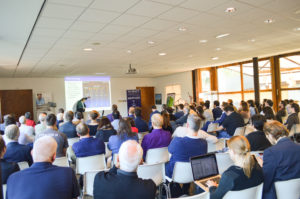 The symposium was kick-started by a presentation by the hosts of the symposium, Eberhard Gill from the TU Delft Space Institute and Kees Buijsrogge from TNO. In the first keynote speech, Henk Hoevers, Head of the Technology Program of SRON, elaborated on SRON’s technology program and strategic long-term plans. His intriguing talk was followed by the next keynote speaker: Mark Bentum from TU Eindhoven. His presentation entitled ‘Are we alone?’ was addressing various existing and future technologies to identify Earth-like planets and inspired the diverse audience.
The symposium was kick-started by a presentation by the hosts of the symposium, Eberhard Gill from the TU Delft Space Institute and Kees Buijsrogge from TNO. In the first keynote speech, Henk Hoevers, Head of the Technology Program of SRON, elaborated on SRON’s technology program and strategic long-term plans. His intriguing talk was followed by the next keynote speaker: Mark Bentum from TU Eindhoven. His presentation entitled ‘Are we alone?’ was addressing various existing and future technologies to identify Earth-like planets and inspired the diverse audience.
The following ‘Meet the Expert’-session offered an extended networking opportunity for all attendees to meet fellow specialists as well as investors. This opportunity was very well received and one could observe pairs or small groups form to discuss about scientific, engineering or societal questions or possibilities of collaboration. The organizers even had prepared short bio’s to facilitate this session, which proved to be an excellent opportunity, based on the responses from attendees.
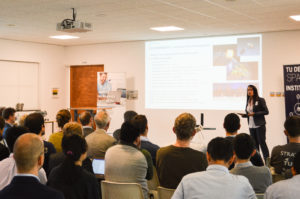 In the second part of the program, the attendees got the opportunity to listen to Grazia Vittadini, the Executive Vice President of Engineering at Airbus Defense & Space, who came all the way from Toulouse, France. Her keynote was devoted to New Space Systems paradigms, such as distributed space systems and Cloud Computing, their perspectives and challenges.
In the second part of the program, the attendees got the opportunity to listen to Grazia Vittadini, the Executive Vice President of Engineering at Airbus Defense & Space, who came all the way from Toulouse, France. Her keynote was devoted to New Space Systems paradigms, such as distributed space systems and Cloud Computing, their perspectives and challenges.
Another highlight on the day was certainly the plenary discussion, where moderator Michel van Baal opened up a lively discussion between the panel and the audience. The panel members were well-known members of the Dutch space community: Kees Buijsrogge (TNO), Joost Carpay (NSO), Franco Ongaro (ESA-ESTEC), and Henri Werij (TU Delft). They were challenged by several statements, such as:
- The Netherlands should cash in on commercialisation in space (commercialisation in space is just a marketing term)
- The Netherlands should do more fundamental space research (why? And who should pay for it? And how to agree on the roadmap?)
- The 200M extra resources allocated by the new government should be used to build a major Dutch Instrument or satellite
- Industry and knowledge institutes should collaborate more
- (Space) Industry should buy more IP of knowledge institutes (further development of existing technologies)
And the audience could, of course, also contribute with their questions and insights. Topics included commercialization in space, the extra resources allocated by the new government, and the collaboration of industry and knowledge institutes.
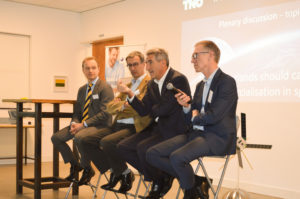
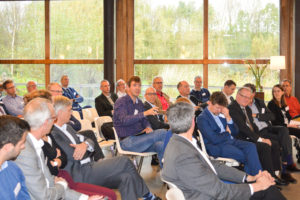
Following the plenary discussion, a poster competition had been organized to show and discuss selected aspects of research at TU Delft. Ten PhD and master students from several faculties involved in the TU Delft Space Institute got the opportunity to present their research and lively discussions emerged. Topics ranged from adaptive optics to asteroid mining and buckling of launch vehicles. 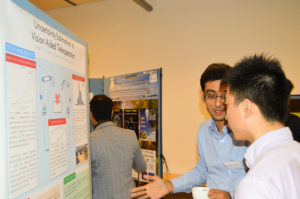 Not only did the students explain their research on the basis of their poster, they also prepared a two minute pitch on their research. The winners of the competition, Marsil de Athay de Costa e Silva and Dadui Cordeiro Guerrieri, were awarded with a financial contribution for attending a European conference for their outstanding work on micro-propulsion.
Not only did the students explain their research on the basis of their poster, they also prepared a two minute pitch on their research. The winners of the competition, Marsil de Athay de Costa e Silva and Dadui Cordeiro Guerrieri, were awarded with a financial contribution for attending a European conference for their outstanding work on micro-propulsion.
As Dutch tradition states, at the end of the symposium there was a borrel which extended the networking even more. The TU Delft Space Institute is planning to take the lead in organizing a succession of the success of this symposium in 2018, co-organizers welcome.